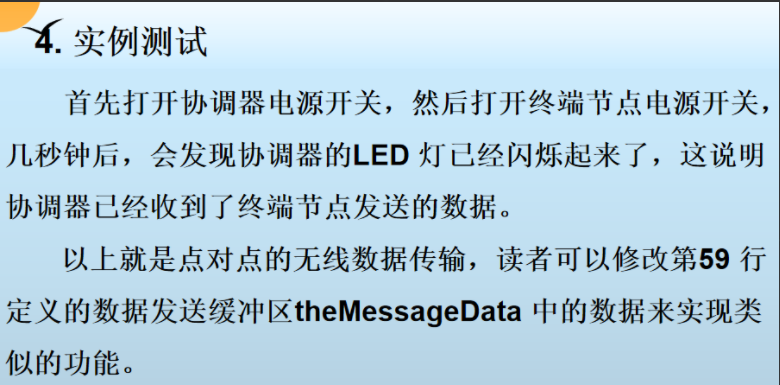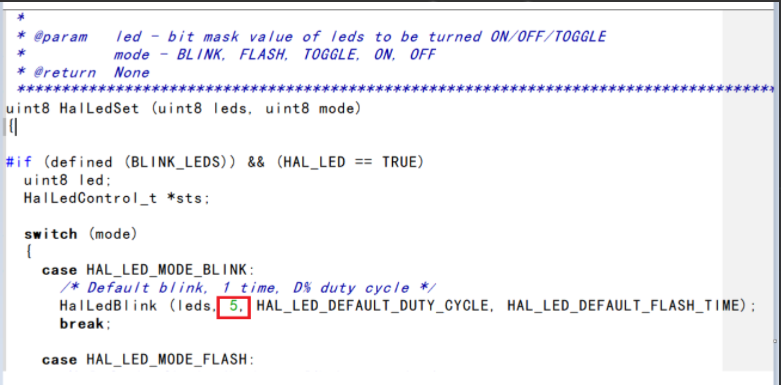实验要求
实验源码
/*exam1coo.h*/
#ifndef EXAM1COO_H
#define EXAM1COO_H
#ifdef __cplusplus
extern "C"
{
#endif
#include "ZComDef.h"
#define GENERICAPP_ENDPOINT 10
#define GENERICAPP_PROFID 0x0F04
#define GENERICAPP_DEVICEID 0x0001
#define GENERICAPP_DEVICE_VERSION 0
#define GENERICAPP_FLAGS 0
#define GENERICAPP_MAX_CLUSTERS 1
#define GENERICAPP_CLUSTERID 1
extern void GenericApp_Init( byte task_id );
extern UINT16 GenericApp_ProcessEvent( byte task_id, UINT16 events );
#ifdef __cplusplus
}
#endif
#endif /* GENERICAPP_H */
/*exam1coo.c*/
#include "OSAL.h"
#include "AF.h"
#include "ZDApp.h"
#include "ZDObject.h"
#include "ZDProfile.h"
#include <string.h>
#include <stdio.h>
#include "exam1coo.h"
#include "DebugTrace.h"
#if !defined( WIN32 )
#include "OnBoard.h"
#endif
/* HAL */
#include "hal_lcd.h"
#include "hal_led.h"
#include "hal_key.h"
#include "hal_uart.h"
const cId_t GenericApp_ClusterList[GENERICAPP_MAX_CLUSTERS] =
{
GENERICAPP_CLUSTERID
};
const SimpleDescriptionFormat_t GenericApp_SimpleDesc =
{
GENERICAPP_ENDPOINT, // int Endpoint;
GENERICAPP_PROFID, // uint16 AppProfId[2];
GENERICAPP_DEVICEID, // uint16 AppDeviceId[2];
GENERICAPP_DEVICE_VERSION, // int AppDevVer:4;
GENERICAPP_FLAGS, // int AppFlags:4;
GENERICAPP_MAX_CLUSTERS, // byte AppNumInClusters;
(cId_t *)GenericApp_ClusterList, // byte *pAppInClusterList;
GENERICAPP_MAX_CLUSTERS, // byte AppNumInClusters;
(cId_t *)GenericApp_ClusterList // byte *pAppInClusterList;
};
endPointDesc_t GenericApp_epDesc;
byte GenericApp_TaskID; // Task ID for internal task/event processing
// This variable will be received when
// GenericApp_Init() is called.
devStates_t GenericApp_NwkState;
byte GenericApp_TransID; // This is the unique message ID (counter)
void GenericApp_MessageMSGCB( afIncomingMSGPacket_t *pckt );
void GenericApp_Init( byte task_id )
{
GenericApp_TaskID = task_id;
GenericApp_NwkState = DEV_INIT;
GenericApp_TransID = 0;
// Fill out the endpoint description.
GenericApp_epDesc.endPoint = GENERICAPP_ENDPOINT;
GenericApp_epDesc.task_id = &GenericApp_TaskID;
GenericApp_epDesc.simpleDesc
= (SimpleDescriptionFormat_t *)&GenericApp_SimpleDesc;
GenericApp_epDesc.latencyReq = noLatencyReqs;
// Register the endpoint description with the AF
afRegister( &GenericApp_epDesc );
}
UINT16 GenericApp_ProcessEvent( byte task_id, UINT16 events )
{
afIncomingMSGPacket_t *MSGpkt;
(void)task_id; // Intentionally unreferenced parameter
if ( events & SYS_EVENT_MSG )
{
MSGpkt = (afIncomingMSGPacket_t *)osal_msg_receive( GenericApp_TaskID );
while ( MSGpkt )
{
switch ( MSGpkt->hdr.event )
{
case AF_INCOMING_MSG_CMD://协调器收到无线数据
GenericApp_MessageMSGCB( MSGpkt );
break;
default:
break;
}
// Release the memory
osal_msg_deallocate( (uint8 *)MSGpkt );
// Next
MSGpkt = (afIncomingMSGPacket_t *)osal_msg_receive( GenericApp_TaskID );
}
// return unprocessed events
return (events ^ SYS_EVENT_MSG);
}
// Discard unknown events
return 0;
}
void GenericApp_MessageMSGCB( afIncomingMSGPacket_t *pkt )
{
unsigned char buffer[10];
switch ( pkt->clusterId )
{
case GENERICAPP_CLUSTERID:
osal_memcpy(buffer,pkt->cmd.Data,10);//把数据拷贝到buffer
if(osal_memcmp(buffer,"Enddevice",9)==TRUE)
{
HalLedSet (HAL_LED_2, HAL_LED_MODE_BLINK);
}
break;
}
}
/*exam1end.h*/
#include "OSAL.h"
#include "AF.h"
#include "ZDApp.h"
#include "ZDObject.h"
#include "ZDProfile.h"
#include <string.h>
#include <stdio.h>
#include "exam1coo.h"
#include "DebugTrace.h"
#if !defined( WIN32 )
#include "OnBoard.h"
#endif
/* HAL */
#include "hal_lcd.h"
#include "hal_led.h"
#include "hal_key.h"
#include "hal_uart.h"
const cId_t GenericApp_ClusterList[GENERICAPP_MAX_CLUSTERS] =
{
GENERICAPP_CLUSTERID
};
const SimpleDescriptionFormat_t GenericApp_SimpleDesc =
{
GENERICAPP_ENDPOINT, // int Endpoint;
GENERICAPP_PROFID, // uint16 AppProfId[2];
GENERICAPP_DEVICEID, // uint16 AppDeviceId[2];
GENERICAPP_DEVICE_VERSION, // int AppDevVer:4;
GENERICAPP_FLAGS, // int AppFlags:4;
GENERICAPP_MAX_CLUSTERS, // byte AppNumInClusters;
(cId_t *)GenericApp_ClusterList, // byte *pAppInClusterList;
GENERICAPP_MAX_CLUSTERS, // byte AppNumInClusters;
(cId_t *)GenericApp_ClusterList // byte *pAppInClusterList;
};
endPointDesc_t GenericApp_epDesc;
afAddrType_t GenericApp_DstAddr;
byte GenericApp_TaskID; // Task ID for internal task/event processing
// This variable will be received when
// GenericApp_Init() is called.
devStates_t GenericApp_NwkState;
byte GenericApp_TransID; // This is the unique message ID (counter)
void GenericApp_MessageMSGCB(void);
void GenericApp_Init( byte task_id )
{
GenericApp_TaskID = task_id;
GenericApp_NwkState = DEV_INIT;
GenericApp_TransID = 0;
GenericApp_DstAddr.addrMode = (afAddrMode_t)Addr16Bit;
GenericApp_DstAddr.endPoint = GENERICAPP_ENDPOINT;
GenericApp_DstAddr.addr.shortAddr = 0;
// Fill out the endpoint description.
GenericApp_epDesc.endPoint = GENERICAPP_ENDPOINT;
GenericApp_epDesc.task_id = &GenericApp_TaskID;
GenericApp_epDesc.simpleDesc
= (SimpleDescriptionFormat_t *)&GenericApp_SimpleDesc;
GenericApp_epDesc.latencyReq = noLatencyReqs;
// Register the endpoint description with the AF
afRegister( &GenericApp_epDesc );
}
UINT16 GenericApp_ProcessEvent( byte task_id, UINT16 events )
{
afIncomingMSGPacket_t *MSGpkt;
(void)task_id; // Intentionally unreferenced parameter
if ( events & SYS_EVENT_MSG )
{
MSGpkt = (afIncomingMSGPacket_t *)osal_msg_receive( GenericApp_TaskID );
while ( MSGpkt )
{
switch ( MSGpkt->hdr.event )
{
case ZDO_STATE_CHANGE:
GenericApp_NwkState = (devStates_t)(MSGpkt->hdr.status);
if(GenericApp_NwkState == DEV_END_DEVICE)
{
GenericApp_MessageMSGCB();
}
break;
default:
break;
}
// Release the memory
osal_msg_deallocate( (uint8 *)MSGpkt );
// Next
MSGpkt = (afIncomingMSGPacket_t *)osal_msg_receive( GenericApp_TaskID );
}
// return unprocessed events
return (events ^ SYS_EVENT_MSG);
}
// Discard unknown events
return 0;
}
void GenericApp_MessageMSGCB(void)
{
unsigned char buffer[10] = "Enddevice";
AF_DataRequest( &GenericApp_DstAddr, &GenericApp_epDesc,
GENERICAPP_CLUSTERID,
(byte)osal_strlen(buffer) + 1,
buffer,
&GenericApp_TransID,
AF_DISCV_ROUTE,
AF_DEFAULT_RADIUS );
HalLedSet(HAL_LED_2, HAL_LED_MODE_BLINK);
}
实验思路
协调器:等待接收终端发送的数据,并比较字符串是否是规定的Enddevice,是就进行灯闪烁操作
终端:当网络状态发生改变(即:连接上协调器组建好的网络)时,向协调器发送Enddevice,并进行灯闪烁操作
补充
在hal_led.c中调用
HalLedSet(HAL_LED_2, HAL_LED_MODE_BLINK);
函数时默认只闪烁一次,可在hal_led.c中的uint8 HalLedSet (uint8 leds, uint8 mode)内修改闪烁次数
实验现象
智能家居实验一现象(点击跳转)
最后
以上就是怕孤独面包最近收集整理的关于实验一 —— 终端连接协调器组件好的网络的全部内容,更多相关实验一内容请搜索靠谱客的其他文章。
本图文内容来源于网友提供,作为学习参考使用,或来自网络收集整理,版权属于原作者所有。










发表评论 取消回复